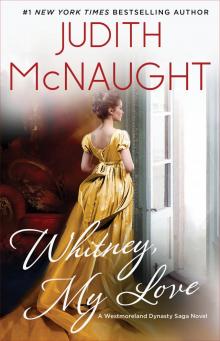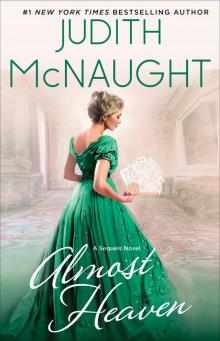- Home
- Judith McNaught
Whitney, My Love Page 6
Whitney, My Love Read online
Page 6
Lady Anne and Whitney came into the room at that moment, and Edward turned on his wife. “God’s armpits!” he exploded, jerking off his headpiece and waving it angrily at her as he waddled across the room, his tail dragging behind him. “How am I ever going to have a cigar wearing this, may I ask?”
Lady Anne smiled imperturbably as she surveyed him in the costume she had chosen without consulting him. “I couldn’t get your favorite Henry the Eighth costume, and I was perfectly sure you wouldn’t care for the elephant costume—”
“Elephant!” Edward repeated bitterly, glowering at her. “I’m surprised you didn’t purchase that getup for me. You could have had me crawling about on all fours, waving my trunk and stabbing people in the rump with my tusks! Madam, I have a reputation to maintain, a dignity—”
“Hush, dear,” she remonstrated affectionately. “What will Whitney think—”
“I’ll tell you what she’ll think—she’ll think I look like an ass. Everyone will think I look like an ass!” He turned his head toward Whitney. “Go ahead, my dear, tell your aunt I look like an ass!”
Whitney regarded him with laughing fondness. “Your costume is very clever and original, Uncle Edward,” she said diplomatically, then she sidetracked him completely by mentioning the name of a lifelong rival. “I did hear, though, that Herbert Granville is coming as a horse.”
“No, really?” Lord Gilbert said, instantly amused. “Which end?”
Her eyes twinkled at him. “I forgot to ask.”
He chuckled, then said, “Let me guess who you are supposed to be.” Whitney twirled around for his inspection. Her Grecian gown of filmy white silk was fastened at the left shoulder with an amethyst broach, leaving the other creamy shoulder tantalizingly bare. Its gossamer folds clung provocatively to her full breasts and narrow waist, then fell gracefully to the floor. The thick clusters of her shining hair were bound with vibrant buttercups and violets. “Venus,” he decided.
Whitney shook her head. “Here—this clue will help.” She swirled a purple satin mantle over her shoulders and waited expectantly.
“Venus,” he declared again, more emphatically.
“No,” she said, kissing him on the cheek. “Actually, the dressmaker tried to improve on Greek mythology. I’m supposed to be Persephone, but she is always depicted in a simpler, girlish gown.”
“Who?” Edward echoed.
“Persephone, the goddess of spring,” Whitney said. “Remember, Uncle Edward? She is always shown with violets and buttercups in her hair, and wearing a purple mantle like this one?” When her uncle still looked confused, Whitney added, “Hades seized her while she was gathering flowers and carried her off to live in the underworld as his wife.”
“Rotten thing for him to have done,” Edward replied absently, “but I like your costume, my dear. Everyone will be so busy trying to figure out who you’re supposed to be, they won’t have time to wonder who the obese crocodile is.” With that he offered his arm to Whitney, and the other to Anne, who was gowned as a medieval queen, complete with conical headdress and veil.
Waves of laughter surged across the Armands’ overcrowded ballroom, drowning out the efforts of the musicians, then receding, leaving behind the persistent undertow of conversation. On the congested dance floor, extravagantly costumed guests struggled for space to dance to music they could scarcely hear.
Standing on the sidelines, surrounded by her personal entourage of admirers, Whitney smiled serenely. She watched Nicki arrive, nod briefly to his mother, then begin making his way unerringly toward her, recognizing her despite her white demi-mask. He was coming from another party and was not wearing a costume. Whitney studied him with an inward smile; she admired everything about him, from the easy way he wore his elegant clothes to his sophisticated charm. For a fleeting moment, the memory of the way his mouth had felt as it moved over hers tingled through her.
When he was near, he flicked a level, impassive glance over the men standing around her, and they parted to make a place for him as if he had ordered them aside. Grinning wolfishly, he surveyed her Grecian gown, purple mantle, and the violets and buttercups twined in her glossy hair. He lifted her fingers to his lips and raised his voice in order to be heard over the din of conversation. “You are ravishing tonight, Venus.”
“Amen!” agreed an enormous banana who was struggling to fight his way past Whitney’s group.
“Ravissante!” declared a knight in armor, raising his visor and fixing Whitney with an appreciative leer.
Nicki passed a cold look over the two, and Whitney demurely raised her fan. But behind the silken slats, she was smiling widely. This was her world now, and she warmed with a feeling of security. In France, when she said something unusual, there were no snorts of disapproval or gasps of outrage. Instead, people said she was “witty” and “lively” and even quoted her. Surely when she went home to England it would be the same. She had made dreadful mistakes there as a girl. She knew better now, and she would not disgrace herself again.
Beside her, she felt Nicki’s admiring gaze moving over her silk dress, but she did not bother to tell him that she wasn’t costumed as Venus. No one at the entire ball seemed to have heard of any female from mythology other than Venus, and the clue of her purple mantle and the violets and buttercups in her hair meant nothing to them. Long ago, she’d given up explaining.
She was in the process of deciding on whom to bestow the honor of fetching her more punch when André Rousseau, one of her most enduring admirers, noticed that her glass was empty. “But this cannot be permitted, Mademoiselle,” he said dramatically. “I did not realize that your glass required attention. May I?” he said, extending his hand toward the offending glass.
Whitney surrendered it to him, and he bowed. “An honor, Mademoiselle.” With a triumphant look at the other gentlemen, he departed in the direction of the gigantic crystal fountain which gurgled forth a ceaseless supply of punch.
Would Paul think it was an honor to fetch punch for her now? Whitney wondered dreamily. The idea of Paul Sevarin flushing with gratitude over being allowed to do an errand for her was so ludicrous that Whitney smiled. If only he could see her here, surrounded by suitors, courted and sought after.
Abruptly, Whitney jerked her thoughts from Paul back to reality as she realized that she had been inadvertently staring at a man across the room who was costumed entirely in black. Below his black half mask, the man’s mouth lifted in a slow, amused smile, and he inclined his head to her in the merest mockery of a bow.
Hot with embarrassment over being caught staring, Whitney turned away so quickly that she nearly knocked the glass from André’s outstretched hand. “Your punch, Mademoiselle,” he said, offering the glass to her as if he were presenting her with a handful of diamonds. As Whitney thanked him and took the glass, he glanced ruefully at his plum-colored satin waistcoat which was now stained with wet spots.
In answer to Whitney’s sympathetic inquiry as to how he had gotten wet, André gravely recounted the dangers he’d faced in the quest for her punch. “It is most treacherous to make one’s way through the crowd, Mademoiselle. In the short time I was away from your side, I was trod upon by an inebriated lion, shoved by the same banana who addressed you earlier, and tripped by the tail of a crocodile who cursed at me when I stumbled.”
“I—I’m so sorry, André,” Whitney commiserated, choking on a horrified giggle at the mention of the crocodile. “It must have been dreadful for you.”
“It was nothing!” André contradicted dramatically, making it sound as if it had been something very great indeed. “For you, I would do anything. For you, no task could be too difficult. For you, I would cross the Channel on a raft, tear the heart from my chest . . .”
“Perhaps even attempt another trip to the punch fountain?” Whitney teased.
Solemnly, André declared that he would even do that.
Nicki regarded the younger man with a mixture of pity, amusement, and disgust. “Chérie,” h
e said to Whitney, tucking her hand in the crook of his arm and leading her toward the French doors that opened out onto the patio. “Either marry André, or else cut the poor devil’s line. If you do not, he is bound to try something truly dangerous for you, like crossing the street.”
“I suppose I ought to marry him,” Whitney said with an audacious sidewise smile. “After all, you said yourself that he would make me a fine husband, that very first night when you came to the debutante ball and danced with me.”
Nicki was silent until they were standing outside on the patio. “It would be a mistake for you to marry him, for André Rousseau’s family and mine are old friends, and it would sorely strain that friendship if I were to kill their only son, merely to make you a widow.”
Startled by the threatening words, Whitney snapped her head up, only to find that Nicki was grinning at her. “That really is too bad of you, Nicki. I like André, and I like you. We are all friends.”
“Friends?” he repeated. “You and I are better than that, I would say.”
“Well, good friends then,” Whitney relented uncomfortably.
They remained outdoors, speaking to acquaintances who strolled past them on the patio, while Whitney tried to think of some way to restore her friendship with Nicki to the casually impersonal one they’d enjoyed until a few months ago. Suddenly he spoke and Whitney lurched with surprise at the topic. “At what age is an English woman expected to marry?”
“No later than five-and-thirty,” Whitney lied promptly.
“Stop, I am serious.”
“Very well,” Whitney smiled, desperately trying to keep things light. “No later than five-and-twenty, then.”
“It is time you think of marriage.”
“I would much rather think of dancing.”
Nicki looked on the verge of argument, then he reconsidered and offered her his arm. “We’ll dance then,” he said curtly.
But even in that, he was to be thwarted. A deep voice that seemed to leap out of the shadows behind them said, “Unfortunately, Monsieur, Miss Stone has promised this waltz to me.”
Whitney turned in astonishment as a black-cloaked form materialized from the darkness. Even without the almost Satanic costume, Whitney would have recognized that mocking smile—it was identical to the one this man had given her across the ballroom, when he’d caught her inadvertently staring at him. “You promised me this dance,” Satan said when she hesitated.
Whitney had no idea who this unidentified acquaintance could be, but she was very anxious to avoid further conversation about marriage with Nicki. “I don’t remember promising anyone a dance tonight,” she said hesitantly.
“You promised me months ago,” Satan informed her, putting his hand beneath her elbow and exerting just enough pressure to begin drawing her with him toward the ballroom.
Smothering a smile at the man’s outrageous audacity, Whitney looked over her shoulder and politely excused herself to Nicki, but she could feel his cool gaze on her back with every step she took.
Nicki was forgotten, however, as she stepped into Satan’s arms and found herself being whirled around in time to the sweeping music by a man who danced with the easy grace of someone who has waltzed a thousand times and more. Around and around they floated until Whitney couldn’t stand the suspense any longer. “Did I really promise you a dance tonight?” she asked.
“No,” he said.
His blunt answer made her laugh. “Who are you?” she asked conspiratorially.
A lazy grin swept across his tanned face. “A friend?” he offered in a voice rich and deep.
Whitney didn’t recognize his voice at all. “No. You are an acquaintance, but not a friend.”
“I will have to remedy that,” he replied with absolute confidence that he could.
Whitney felt a perverse desire to shatter a little of his arrogant self-assurance. “I’m afraid that’s impossible. I already have more friends than I know what to do with now, and they all vow their loyalty to me until death.”
“In that case,” he said, a smile lighting his gray eyes, “perhaps one of them will meet with an accident—with a little assistance from me.”
Whitney was unable to stop her answering smile. His last words held no menace, she knew; he was merely playing verbal chess with her, and it was exhilarating to try to counter his moves. “It would be most unkind of you to hasten any of my friends to their demise. My friends are a disreputable lot, and their final destination may not have a pleasant climate.”
“A warm one?” he teased.
With a sigh of mock regret, Whitney solemnly nodded. “I’m afraid so.”
He laughed at her, a throaty, contagious laugh, and his eyes suddenly seemed to regard her with a bold, speculative gleam that Whitney found unsettling. She looked away, trying to decide who he was. Outside on the patio, he’d spoken in flawless French, yet here on the dance floor, his English was equally flawless and without a trace of an accent. His face, that part of it which wasn’t covered by his black mask, had a healthy golden tan which he certainly couldn’t have acquired in Paris this early in the spring. And not in England, either.
The task of trying to place him among the hundreds of men to whom she’d been introduced during the last two years was formidable, but Whitney tried anyway. Mentally, she reviewed the men of her acquaintance, discarding one after another as being either not tall enough or with eyes of a color other than his unusual gray. His height, easily two inches over six feet, was his most outstanding feature. She reviewed the clues but still could not identify him. Yet, he knew her well enough to recognize her even though she was wearing a demi-mask. When the strains of the waltz died, she was no closer to identifying him than she had been when the dance began.
Whitney stepped away from him, half turning toward Nicki who was standing near the edge of the dance floor, but her partner firmly claimed her hand, tucked it under his arm, and drew her in the opposite direction toward the doors opening off the south side of the house into the gardens.
Several steps from the doors, Whitney began to doubt the wisdom of letting herself be led into the night by a man whom she couldn’t yet identify. She was on the verge of refusing to take another step when she saw that there were at least two dozen guests scattered about the brick paths that wound through the lantern-lit gardens, any one of whom would come to her aid if her escort failed to conduct himself as a gentleman. Not that Whitney actually doubted he was a gentleman, for the Armands were notoriously meticulous in choosing their guests.
Outside, she reached behind her and untied the ribbons of her demi-mask, letting it dangle from her fingers as she breathed in the fragrance of the spring night scented with blossoms. They came to a white ornamental iron table and chairs, well within sight of the house and other guests, and her escort pulled out a chair for her. “No, I’d rather stand,” Whitney said, reveling in the relative quiet and the beauty of the dappled moonlight.
“Well, Persephone, how are we to manage our friendship if none of your present friends are likely to do me the favor of dying in the foreseeable future?”
Whitney smiled, pleased that at least one person at the ball didn’t confuse her with Venus. “How did you know who I am?”
She was referring to her identity of Persephone, but evidently, Satan misunderstood her, for he shrugged and said, “DuVille isn’t wearing a mask and, since rumor has it that the two of you are inseparable, when I saw him, I realized who you were.”
A frown marred Whitney’s smooth forehead at the unwelcome news that she and Nicki were being linked together by the gossips.
“Since that answer seems to disturb you,” he said drily, “perhaps I should have been more honest and told you that there are certain . . . attributes . . . of yours that made it easy for me to identify you even with your mask on and before DuVille arrived.”
My God! Did his gaze actually wander over her body, or was it only her imagination? When he leaned back and casually perched his hip on the wrought ir
on table, Whitney felt suddenly uneasy. “Who are you?” she demanded firmly.
“A friend.”
“Absolutely not! I can’t recall anyone of my acquaintance with you height or eyes, or with such outrageously bold manners, especially for an Englishman.” She paused and studied him uncertainly. “Are you English?”
He gazed down into her searching green eyes and chuckled. “How remiss of me,” he mocked lightly. “I should have said ‘what ho’ and ‘egad’ and ‘quite so’—so that you would know I am.”
His humor was infectious, and Whitney could not stop her answering smile. “Very well, now that you’ve admitted you’re English, tell me who you are.”
“Who would you like for me to be, little one?” he asked. “Women always admire noble titles—would you like it if I told you I am a duke?”
Whitney burst out laughing. “You may be a highwayman, or even a pirate.” She twinkled at him. “But you are no more a duke than I am.”
The amusement vanished from his smile, replaced by a quizzical puzzlement. “May I ask why you are so certain that I am not?”
Thinking back to the only duke she’d ever seen, Whitney impudently surveyed him from head to foot, deliberately repaying him for the lingering glance he’d subjected her to. “Beginning with the most obvious, if you were a duke, you would have a quizzing glass.”
“But how would I use a quizzing glass with a mask?” he countered curiously.
“A duke does not use a quizzing glass to see—it is merely an affectation. He raises it to his eye and peers at all the ladies in the room. But there are other reasons you cannot possibly be a duke,” she continued irrepressibly. “You don’t walk with a cane, you don’t wheeze and snort, and in all honesty, I doubt you could claim even a mild case of gout to your credit.”
“Gout!” he choked, laughing.
Whitney nodded. “Without the cane, the gout, and the wheezing and snorting, you cannot possibly hope to convince anyone that you are a duke. Couldn’t you choose some other title to which to aspire? You might be able to pass yourself off as an Earl if you had a bit of a squint and a clubfoot.”

 Miracles
Miracles Paradise
Paradise Every Breath You Take
Every Breath You Take Until You
Until You A Kingdom of Dreams
A Kingdom of Dreams Whitney, My Love
Whitney, My Love Night Whispers
Night Whispers Something Wonderful
Something Wonderful Someone to Watch Over Me
Someone to Watch Over Me Almost Heaven
Almost Heaven Double Exposure: From a Gift of Love
Double Exposure: From a Gift of Love Tender Triumph
Tender Triumph Once and Always
Once and Always Double Standards
Double Standards